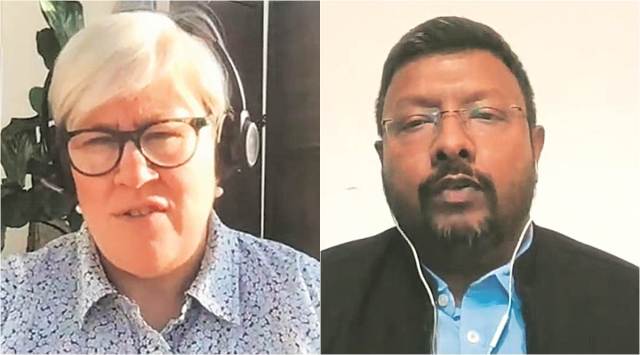Rachel Kyte: ‘Helping India make its transition is also good for the world’
🔴 Rachel Kyte was in conversation with Anil Sasi, National Business Editor, The Indian Express, about the recent Glasgow summit, dependence on coal and the way forward.
 Rachel Kyte; Anil Sasi
Rachel Kyte; Anil SasiRachel Kyte, the first ever woman Dean of The Fletcher School at Tufts University, is concerned about the world being so far off track in terms of tackling climate change. “There’s an ambition gap, we need to cut emissions drastically over the next decade and into the 2030s. Some of the plans that governments have, show that we are adrift, we’re sort of heading on a trajectory of 2.4 degrees and we need to be 1.5 degrees and the difference between 2.4 and 1.5 is life and death for cultures and communities around the world,” shared Kyte at the fourth edition of the Financial Times and The Indian Express debates. Kyte was in conversation with Anil Sasi, National Business Editor, The Indian Express, about the recent Glasgow summit, dependence on coal and the way forward.
Kyte, who’s a summit veteran and an academic, addressed the ongoing crushing global energy crisis across Europe, North America, China, India, where the countries were forced to ramp up their reliance on fossil fuels. “It has an impact on the question of how countries manage the implementation of the commitments that they’ve made, but the EU’s commitment to a 55 per cent cut in emissions is locked. In the UK, the commitment, for example, is locked in with a legally binding commitment to net zero. The US has not got an implementation plan, that’s sort of moving through Congress right now. China has an energy crisis as well,” said Kyte.
She also addressed the prospect of Western nations opening up a robust credit line for India. “What was lost in the coverage of PM Modi’s speech in Glasgow — the focus was on the net zero pledge by 2070. But importantly, it was the commitment to 50 per cent of electricity production to be clean by 2030, which is a very rapid advance of the electricity sector in India. There was the request for a trillion dollars to help India make its transition. Helping India make its transition is not only good for India, it’s also good for the world,” said Kyte.







